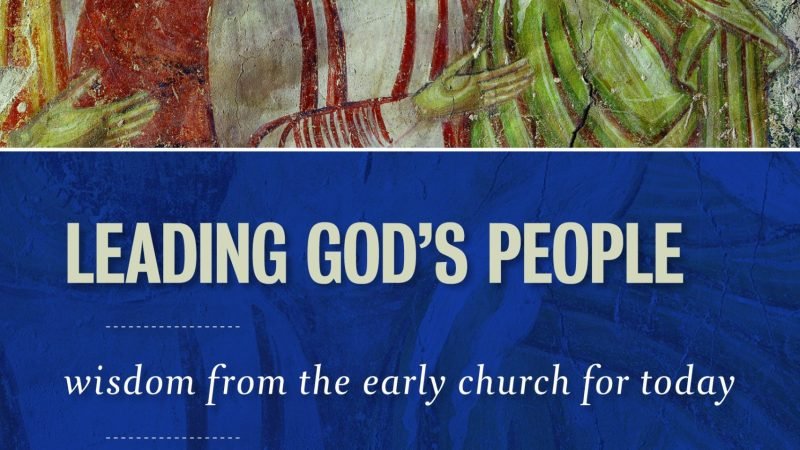I found Leading God’s People: Wisdom from the Early Church for Today to be helpful and personally-affirming. The author, Christopher A. Beeley, through his study of the early church fathers, affirms the idea that church leadership is not as much about personal charisma, and having read the latest bestselling self-help books, as it is about being the sort of person that can honor God in all of life.
Beeley downplays much of what passes for leadership “techniques” that exist, especially in the North American church. Using the words of Paul and of the early church fathers, Beeley again and again stresses the need for a Christian leader to be one whose character and spiritual life is top notch. This is highlighted at the beginning of the book with his statement that “the effectiveness of the church’s leadership is crucial to its vitality and faithfulness, its spiritual health, and its fulfillment of God’s mission in the world.”1
The book contains five chapters, each highlighting a different aspect of church leadership. The first chapter, “The Leadership of the Church,” focuses on what church leadership is, how the roles came to be, the authority by which one leads, in what manner one leads and the highs and lows of church leadership. The second, “Spirituality for Leadership,” zeros in on the spiritual requirements for church leadership, the role of the Holy Spirit in church leadership, and what can be expected if leadership is undertaken without a stable spiritual foundation. The middle chapter, “The Cure of Souls,” looks at the practical implications of pastoral leadership and how this has been understood over time. The penultimate chapter, “Scripture and Theology,” emphasizes the role that continual absorption in God’s word plays in equipping a church leader. The final chapter, “The Ministry of the Word,” outlines how church leadership plays out on a week-by-week basis, namely the faithful and accurate preaching of the word of God undergirded by prayer and study.
Leading the church
Most of the material in the first chapter of the book was familiar to me either from church history or from my study of scripture. I was struck by Augustine’s comment about the origin of church leaders. He writes, “Of course, if there are good sheep, there are also good shepherds, because good shepherds are made out of good sheep.”2 This beautifully captures the concept of the priesthood of all believers. By this I mean that, while ministers often express a sense of calling from God to validate their vocation—and some like King Saul seem to have obvious characteristics and traits that would advocate them being leaders—more often than not, church leaders are faithful sheep. Some of these sheep would not profess a call, and many would argue vehemently against being called, as was the case for Augustine and others. Yet, often those who are unsure of their calls are the ones who are made into shepherds, and it is the community of believers that plays the biggest role in the discernment process.
This way of thinking is one of the things that draws me to the Anglican tradition over the nondenominational churches I grew up in. A calling usually originates from recognition of gifts by a local congregation. This calling is then passed on to be verified at a diocesan level. Not only does this way of discerning provide a safeguard against being enamored with personal charisma and skills, but it also can serve as a tremendous affirmation and encouragement for one questioning his calling. When I face a moment of questioning my inward call, I can find comfort in the fact that the community of the church has identified my calling. I should not surrender my calling until they do.
Spiritual leadership
Leading God’s People is a bit of a two-edged sword. I agreed with most of it; unfortunately, agreement does not always equal ability to conform. In the first paragraph of the chapter Beeley writes, “What ultimately move people into a deeper life in Christ is not personal charm, social connections, or managerial expertise … instead, it is the real and palpable holiness of a leader steeped in the grace of Christ.”3 This is a painful reminder of my own lack of personal holiness. Paul also emphasizes that personal holiness extends to the leader’s relationship with his immediate family. Beeley writes, “if we are not allowing God to illuminate [our family relationships] in particular, then we are living in darkness in a profound way.”4
I was particularly impressed with the empasis that Gregory Nazianzen put on the “cure of souls.” I want to learn more about what Gregory says concerning how pastoral care compares to the medical treatment of bodies.
In the fourth chapter, I was struck by these words: “Week in and week out, the most practical thing that enables church leaders to minister well is our study of scripture and our theological rootedness.”5 When this goes along with the reminder that theology “is an inclusive and integrative project”6 a firm foundation is set. I hope to lay this foundation in my own ministry.
Preaching the word
In the final chapter, I was again impressed with Gregory Nazianzen and his affirmation that, “The first of all our concerns is the distribution of the word.”7 I previously would have said the early church fathers were equally concerned with, if not more concerned with, the administration of the Eucharist. However, Beeley writes, “[the early church fathers] believed, without exception, that the main focus of pastoral work and the work of church leadership is not ‘ritual activity’ per se, but the administration of God’s word through preaching, teaching, and pastoral counsel within the celebration of the mysteries of the church.”8 This not to cast a false dichotomy between word and sacrament; instead, let us recognize, as the early church fathers did, their proper relationship.
Of great importance is a proper understanding of what it means to preach well. Beeley relates Augustine’s quotation of Cicero in the last chapter of the book: “teaching your audience is a matter of necessity, delighting them a matter of being agreeable, but swaying them as a matter of victory.”9 Beeley calls this, “probably, the most helpful definition of good Christian preaching that we possess.”10
Beeley then goes on to outline each aim: teaching, delighting, swaying, in the remainder of the chapter. This is helpful for preachers as we continue to shape our preaching by the Bible. He notes that Augustine writes, “The first and most basic aim of Christian preaching is to teach something. After all, people cannot believe in, hope for, or love what they do not know.”11
I found Leading God’s People to be both comforting and convicting. I was pleasantly encouraged by the continuity I found between the early church fathers and the Reformers. This is a resource worth keeping on my bookshelf for years to come.


